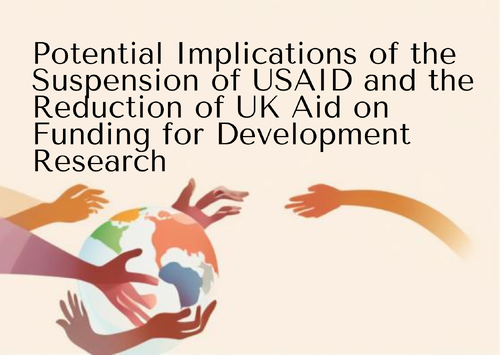
Opinion Piece: Potential Implications of the Suspension of USAID on Funding for Development Research
The recent suspension of the United States Agency for International Development (USAID) has sent shockwaves through the global development research community. As one of the largest and most influential donors in the sector, USAID’s abrupt halt raises profound questions—not only about the immediate disruption to programs and partnerships, but also about the long-term implications for how development programming and research is funded, conducted, and translated into policy.
USAID has long played a dual role: as a vital funder of development programming and as a catalyst for evidence-based policy through its support for rigorous research. The immediate suspension of its activities in January 2025 and the planned elimination of the agency in July threatens both. Researchers across the globe, particularly those in low- and middle-income countries (LMICs), are left in limbo. Projects are paused midstream, and future U.S. funding rounds have disappeared entirely. For institutions that rely heavily on USAID support, the consequences could be existential.
One of the most immediate impacts is on development funding streams. USAID is not only a direct donor but also a signaling institution—its priorities and funding decisions often shape the broader donor landscape. When USAID invests in topics like gender equity, food security, or climate resilience, other donors follow suit. The suspension creates a vacuum that could result in the deprioritization of these critical areas, at least temporarily, as institutions scramble to reassess their financial and strategic footing. This sudden shift creates a breach in trust among implementing partners and institutions that will take more than a resumption of programming to rebuild.
Equally important is the potential reshaping of research priorities and partnerships. USAID has historically emphasized local ownership, encouraging partnerships between U.S. institutions and researchers in the Global South. This model of collaboration—though imperfect—has helped build capacity, transfer skills, and center the voices of those most affected by development challenges. In the absence of USAID, there is a risk that more localized, equity-oriented research agendas will fall by the wayside, replaced by narrower, donor-driven priorities.
However, the disruption also invites reflection—and perhaps innovation. With USAID on pause, there is an opportunity to diversify funding sources and rethink traditional models of research collaboration. Foundations, multilateral institutions, and even private sector actors may step in to fill the gap. While this shift could fragment the funding landscape, it might also allow for more flexible, adaptive, and locally grounded approaches to research. Institutions that have long depended on USAID would do well to use this moment to build broader coalitions and pursue new partnerships, especially those that prioritize co-creation and knowledge sharing with LMIC counterparts.
The challenge, of course, is that not all researchers or institutions are equally positioned to weather the storm. Early-career scholars, especially those working in fragile contexts, face the brunt of the uncertainty. Institutions with fewer resources – especially those local actors previously prioritized by USAID – may be forced to scale down operations or shut down entirely. To mitigate these risks, funders and development actors must urgently coordinate to provide transitional support. Bridge funding, flexible grant mechanisms, and emergency research fellowships could go a long way in sustaining momentum and preserving talent.
Looking forward, the global development research community must also engage in advocacy. The suspension of USAID is not merely a bureaucratic hiccup—it is a political signal. It reflects broader tensions around the role of the U.S. in global affairs and the perceived value of international cooperation. Researchers, practitioners, and policymakers must articulate—clearly and collectively—why sustained investment in development research matters. Evidence-based policy is not a luxury; it is the backbone of effective, accountable development.
The road ahead is uncertain, but not without hope. This moment calls for creativity, solidarity, and strategic foresight. If we seize it wisely, we may emerge with a more resilient, inclusive, and diversified development research ecosystem—one less vulnerable to the vicissitudes of any single donor.
Angela Garvey is a global health and international development professional with over six years of experience working at the intersection of humanitarian assistance, global health security, and conflict resolution. She is currently pursuing a PhD in the School of Law and Government at Dublin City University, where her research focuses on humanitarian and civilian risk in conflict-affected contexts. She completed a Bachelor’s degree in Government and Politics and Spanish Language and a Master’s degree in Public Policy at the University of Maryland. Most recently, she served as a Program and Budget Analyst for USAID's Global Health Security program.